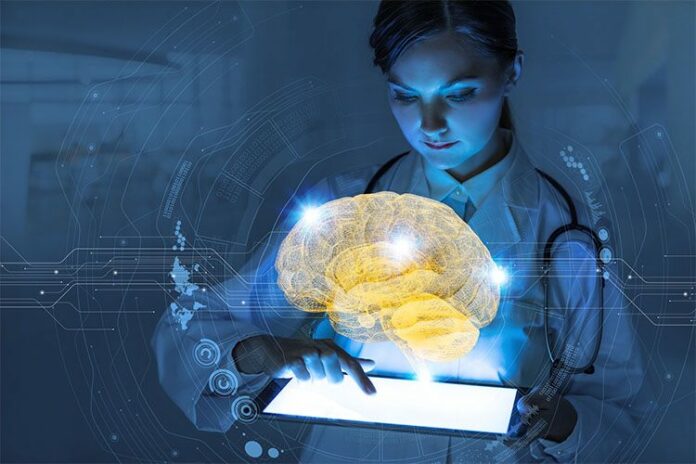What will be the most transformative innovation for healthcare in the next decade? Chances are, it’s going to be the development of Artificial intelligence (AI).
The field of AI, both in software and robotics, offers tremendous potential. It could improve quality of care, increase coverage, and lower costs, in basically every branch of medical services. Dozens of companies, from start-ups to the biggest names in the tech sector, are working on medical AI applications.
What is Medical AI?
Medical AI is the usage of machine learning and software to gather medical information, process the data, and give an output to the user. In this particular field, that user might be a doctor, therapist, caregiver, or the patients themselves. These programs mimic the way that a human thinks about medical issues, looking for causes and solutions.
What could this look like? Imagine that someone notices an unusual mole. They might load up a medical AI-powered screening app and snap a photo. The AI would compare that mole to a database of benign and concerning moles. The user would be advised if it’s better to take a ‘wait and see’ approach or go to the doctor for an exam.
For that first option, the app might prompt the user to snap another photo a month later. The two pictures would be compared, checking for rapid and concerning changes. If the screener app does detect potential skin cancer, it might bring up a schedule of available timeslots for the user’s preferred doctor.
Who’s working on medical AI software? You’ll see programs coming out from tech behemoths like Google and IBM. These bigger companies tend to focus on a broad array of tools for the hospital setting. Smaller companies and startups have a more focused scope. They may aim to lower costs and improve detection accuracy for ultrasound, or develop user-friendly health screener apps.
Why is Medical AI Needed?
A big milestone is coming up in the USA, when by 2030, one-fifth of the US population will be over 65. This aging population will put a lot of pressure on an already burdened healthcare system. Spending is already up. In 2020, healthcare spending rose to a record $4.1 trillion.
Meanwhile, pandemic-related burnout has accentuated a pre-pandemic problem: there aren’t enough people in the medical sector. Mercer projects a shortage of 400,000 home health aides and almost 100,00 medical and lab technologists by 2025. The American Association of Medical Colleges also predicts a shortage of at least 47,000 physicians by 2030.
The future will likely have more people needing services and fewer healthcare providers to give them. Medical AI can step into that gap, giving physicians and technologists the support to see more people while maintaining excellent quality of care. It can also connect caregivers to much-needed resources, and empower patients in their own medical decision-making.
What Will AI Do For You?
AI-powered applications could integrate into every area of the healthcare environment, from home services all the way to a specialist’s office in the hospital. Here’s a closer look at how artificial intelligence fits into the health services picture.
In a hospital or urgent care setting, AI supports clinical decision-making. It can analyze images and patient files, pointing out possible issues. The artificial intelligence programs also work much faster than a human. While the doctor is still consulting with a patient, the program may have already matched symptoms to relevant articles in a digital medical library. And AI can update medical records in real time, giving healthcare teams the most current information.
On the patient level, AI-powered telemedicine increases access to services and can support patient independence. Instead of waiting on the phone to ask a nurse if a symptom requires a hospital visit, the patient might interact with a chatbot. Meanwhile, medical AI integrates with a variety of smart tech and monitoring devices. People with complex health conditions may be able to stay home with the AI acting as a round-the-clock nursing assistant – increasingly important as the senior cohort grows in the USA and decides to age in place. Caregivers get the safety net of a program that lets them know if a medication was missed or if there’s a possible health crisis.
AI applications support distributed and community-focused healthcare. Smartphones and other wearable devices can be turned into diagnostic tools, letting trained assistants take screenings directly into the community. Pharmacies can increase patient safety as a medical AI looks up digital records and flags allergies and drug interactions.
Mental health services may offer enhanced care through AI-powered apps. These applications are more effective than simple printed sheets of take-home exercises. As patients interact with the app, it scales exercise difficulty and sends the results straight into the digital files of the therapist.
Artificial intelligence is also working in tandem with the development of new drugs. Real-time medical data of human trials, run through AI, can recognize patterns in responses. This helps drug development companies get medications out onto the market faster and with lower development costs, which may translate to lower consumer costs.
What AI Can’t Do
All of this may sound like science fiction, but you won’t be seeing a friendly robot doctor anytime soon. Artificial Intelligence has distinct limitations. It isn’t capable of replacing a trained physician or a therapist with years of experience. Instead, these AI-driven technologies work with the patient, their caregiver, and the healthcare team. AI, together with the technology and connectivity that enable it, all support current medical practices, as well as helping to develop innovative new therapies and treatments.

